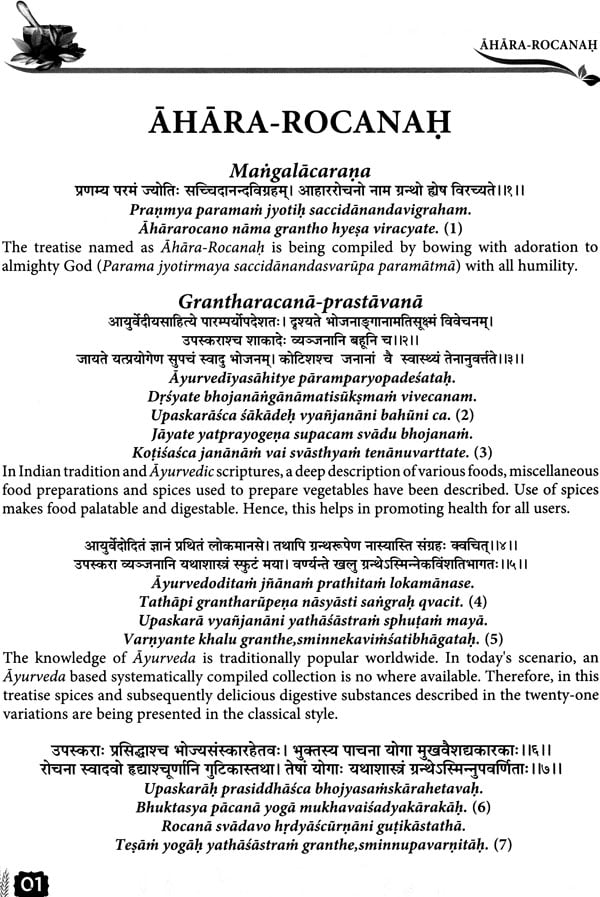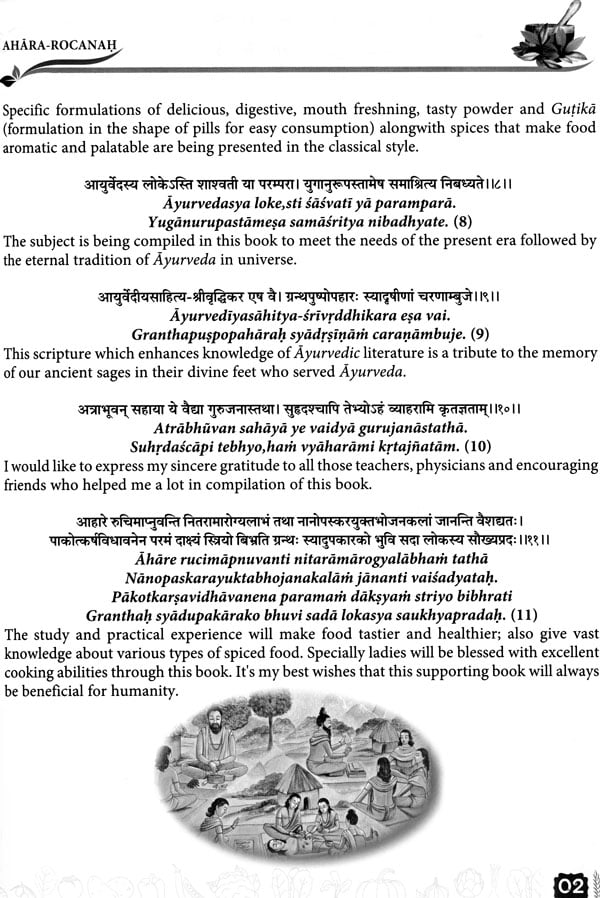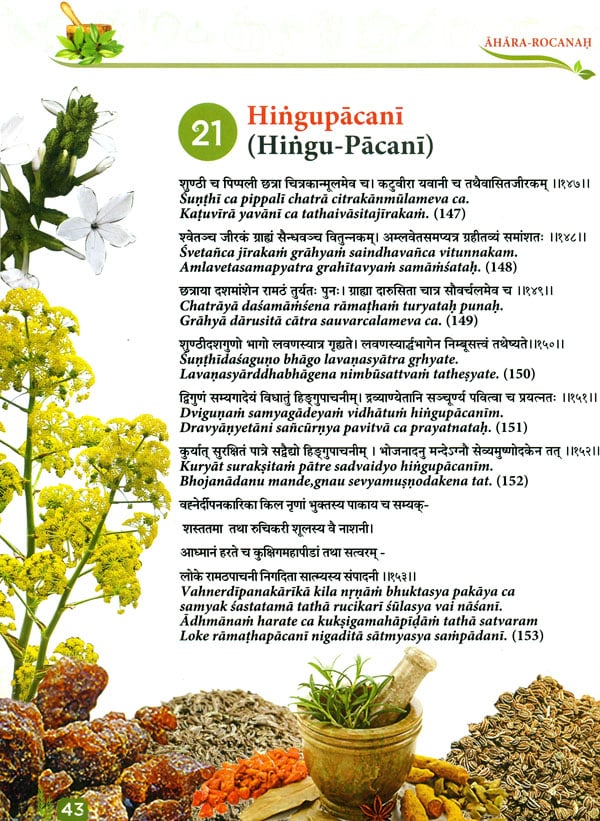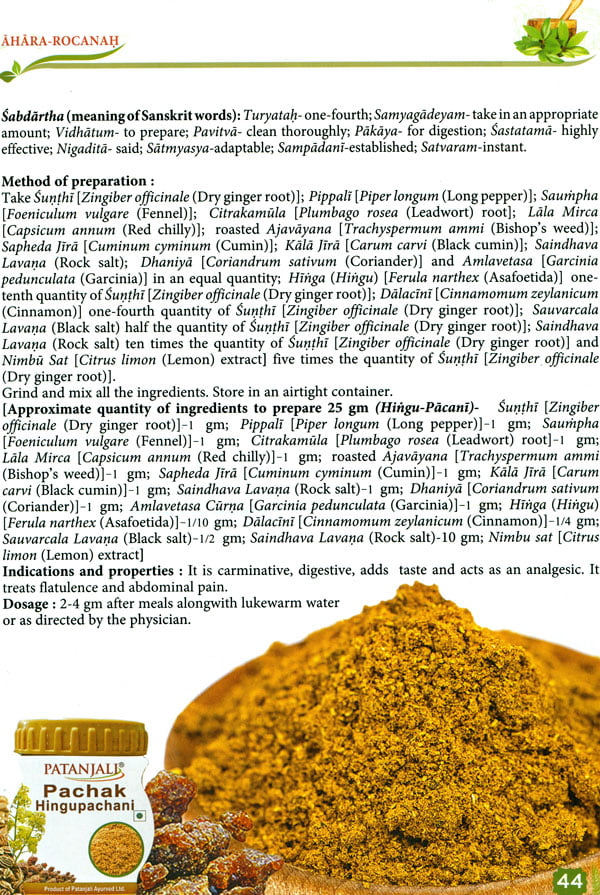
Ahara - Rocanah (First Authentic Treatise of Specific Indian Spices and Flavored Formulations)
Book Specification
| Item Code: | NAN307 |
| Author: | Acharya Balkrishna |
| Publisher: | Divya Prakashan, Haridwar |
| Language: | Sanskrit and English |
| Edition: | 2016 |
| ISBN: | 9789385721038 |
| Pages: | 77 (Throughout Color Illustration) |
| Cover: | Hardcover |
| Other Details | 10.5 inch X 8.0 inch |
| Weight | 520 gm |
Book Description
Health is the main base of four objectives of human endeavor Purushartha-chatustya) i.e., Dharma means righteousness (moral value), Artha means prosperity (economic value), Kama means pleasure or love (psychological value) and Moksa means liberation (spiritual value). For living a happy and healthy life it is very important to follow Ayurveda preachings. For health, abstracted sermons by different ancient sages is as follows:-
Use of only salutary diet promotes health of an individual and maleficent diet is the cause of all diseases. Sapidity and palatability is known to be one of the chief character of salutary diet. While defining the properties of salutary diet in Caraka Samhita, it is said that this type of palatable, fresh and mucilaginous food promotes health. A salutary diet is easy to digest and promotes health through harmony, strength, nutrition, pleasure, etc. As per Sushruta Samhita.-
Sapid and palatable food gives happiness to the mind; strength and activeness in the body. While distasteful and unpalatable food desperates the mind. It is the cause of weakness, laziness, depression and sorrow. Therefore, always take a salutary and palatable diet. Hence precisely cooked delicious and salutary diet itself is a curative medicine. The great sage Kasyapa authenticates this fact as:-
There is no other medicine better than food. A methodically prepared salutary and palatable diet keeps each one healthy without the use of medicine. During treatment a patient cannot survive without food. Therefore, physicians recommend a wholesome diet as a medicine. Hence a wholesome diet is a great medicine in their opinion.
Our life, body strength and mental vigor depends on diet. As described - food is satiety causing, health promoting and a base of body attainment. Food is the main source of enthusiasm, brightness, vigor and intellectual capacity.
Therefore, after realizing the great importance of food, the wise people should keep keen observation on its quality and benefits. Similar idea is being elaborated by Maharsi Dayanand in Satyartha Prakasa as:-
The cooking should be done in such a manner that it acts as a medicine to keep body, soul and home devoid of diseases.
In Indian lifestyle according to culinary science books and traditional preachings various distinctive type of Ahara-Rocana (mouth watering foods) and combinations of spices were popular. For the first time these combinations with their accurate quantity have been presented in this book. Here this subject is being presented in the style of classical verses so that this knowledge of taste enhancing spices will become everlasting and beneficial for society.
Scattered description of taste enhancing spices is available in ancient scriptures. Sour tasting substances like Amlika [Tamarindus indica (Tamarind)], Dadima [Punica granatum (Pomegranate), Nimbu [Citrus limon (Lemon)] and others are being described under the Hridya varga (cardiac stimulant section) of Ayurveda. These substances by stimulating Bodhaka Kapha increase the taste in food. Hingu [Ferula narthex (Asafoetida)], Mirca [Piper nigrum (Black pepper)], Saumpha [Foeniculum vulgare (Fennel)] are substances which stimulate hunger and hence are called digestive substances. In the same way Rat [Brassica juncea (Brown mustard seeds)], Mustaka [Cyperus rotundus (Nut grass)], Adaraka [Zingiber officinale (Wet ginger root)], etc. substances are specifically helpful in digestion and hence are called digestive substances.
In India from ancient times palatable recipes and spices are prepared with the combination of these tasteful, carminative and digestive ingredients.
These delicious recipes enhance digestive vigor and induce easy digestion. These type of delicious Indian recipes are not only popular for their taste in our country but they attracts foreign countries also. This work especially describes the salutary recipes and their related spices, hence it is named as Ahiira-Rocanaf}. This book is a boon to get detailed knowledge about Indian recipes.
According to the preachings of ancient sages this secret should be followed that even palatable food prepared from the spices described in this book is beneficial only when taken in an appropriate quantity. It is a secret that a self controlled person can enjoy the actual pleasure of various delicious foods prepared from these spices only, when the earlier consumed food is completely digested because hunger enhances the palatability.
This fact is supported by Vidura as:-
The hard, laborious working poor people usually enjoy palatable food because hunger stimulates taste in the food and it is difficult for the rich ones. Reason being that rich people normally never do any physical hard work and take heavy meals without feeling hungry. Hence they never feel the actual hunger nor they enjoy the tasty food. Therefore, always remember the golden rule of eating in an appropriate quantity. Acarya Caraka also discloses this secrecy by the quotation given below:-
Intake of food according to digestive vigor in an appropriate quantity is best among all those practices which enhance digestive fire. The same rule is also described in another ancient scripture as:-
Even though boiled water mixed with salt and green vegetables devoid of fat is tasty and nourishing for a healthy person when he is feeling hungry but the person sufferin from dyspepsia neither like delicious recipes that are enriched with six basic tastes nor nourishes him.
Hence, the various types of spices described in this book will be useful only for abstemious, judgmatic and self-controlled people. For their well- being a food craving person should always remember the below mentioned phrase of ancient sage:- Craving for food is the main cause of disease or trouble.
It is true fact that an unwholesome diet taken due to craving for food will cause sickness and trouble. Hence, it is said that the root cause of all sins is greediness and all diseases are due to food craving. Therefore, a self controlled and spiritual person by avoiding craving for taste will be benefited by the combination of spices described in this book. On the auspicious occasion of publication of this book I would like to express my sincere gratitude to Param Pujya Shradheya Swami Ramdev ji Maharaj. Swami ji has revolutionized Yoga practice through his ongoing achievement in reviving Indian culture including Ayurveda. With his guidance and blessings Patanjali Yogpeeth is capable of reestablishing Yoga and Ayurveda not only in India but also throughout the world. On this occasion I am devotedly obliged to Swami ji.
My heartful thanks and appreciation goes to Shri Kamalakant Tripathi and Prof. Vijaypal Shastri 'Pracheta' who willingly helped me out with their abilities in the fulfilment of this work. For their tireless efforts and specific contributions, I give my heartiest blessings and my good wishes for their bright future. I am sure that this Ahara- Racanali book written in the ancient Ayurvedic classical style will be helpful throughout the world. It will surely enhcance and well-establish Ayurvedic tradition.
Acharya Balkrishna, a multi-facet figure, is a popular authority of Ayurveda and a renowned medicinal plant expert. He is a companion of Swami Ramdev ji Maharaj and a founding pillar of Patanjali Yogpeeth (Trust) and Divya Yoga Mandir (Trust). He is a man who has uplifted the spiritual tradition of ancient saints. His famous television programs broadcasted on several channels has revived people's interest in plants, herbal medicines and Ayurveda. His teachings, writings and research have helped the community to realize the importance of natural living and good health with the adaptation of Yoga and Ayurveda in daily life. Under his motivational guidance, research in Ayurveda and medicinal plants has touched new dimensions.
Acharya Balkrishna has authored many books on Yoga and Ayurveda and has edited many scriptures from unpublished Ayurvedic manuscripts. He is the chief editor of Yoga Sandesh, a monthly magazine on Yoga, Ayurveda, health, spirituality and culture and is the compiler and editor of several other books and electronic resources. A famous scripture on Ayurvedic treatment 'Aushadh Darshan', with a sale of more than 1 crore copies is another unique creation by him. His dream project 'world Herbal Encyclopedia' is under publication. He has great expertise in the domain of medicinal and aromatic plants. He is credited for identifying and reporting several rare and endangered medicinal plants from the Himalayan region. Acharya Balkrishna has received innumerous awards and felicitations like 'Vanaushadhipandit' and 'Sugyanshri' for his valuable contributions in the field of Ayurveda. Famous magazines like 'India Today' and 'Outlook' named him among 'Top ten versatile and dynamic young men of India' in Nov. 2009 and Jan. 2010 issues, respectively.
He is a great visionary, highly energetic and a versatile personality with multi-dimensional skills. World's largest food processing unit 'Patanjali Food and Herbal Park' is the result of his innovative idea. He is the inspirational designer behind the huge and highly modernized 'Divya Pharmacy' and Patanjali Ayurveda Ltd. etc. Formation of Patanjali Bio-Research Institute (PBRI) which works for the conservation of nature and environment and promotes organic farming is also the productive thought of his mastermind. He is the founder of various educational institutes like Patanjali University, Patanjali Ayurveda College, Acharyakulam and Vaidik Gurukulam.
He is a man filled with the zeal of humanity and compassion, who selflessly works for the service of mankind. He skillfully contributes towards the preservation of traditional heritage of Yoga and Ayurveda, and the conservation of medicinal plants. His efforts have Significantly contributed to the social, cultural, educational and economic aspects of India along with the establishment of remarkable standards in the domains of literature and therapy at a global level.
Contents
| Mangalacarana, Granthavisaya nirdesa | 1-2 | |
| 1 | Canakopaskaran (Cana/Chola- Masala) | 3-4 |
| 2 | Khandopaskaran (Cata-Masala) | 5-6 |
| 3 | Amiksopaskarah (Panira-Masala) | 7-8 |
| 4 | Mrdupolikopaskarah (Pavabhaji-Masala) | 9-10 |
| 5 | Rajamasopaskaran (Rajama-Masala) | 11-12 |
| 6 | Kvathitopaskarali (Kadhi-Masala) | 13-14 |
| 7 | Sambharopaskaran (Sambhara- Masala) | 15-16 |
| 8 | Sakopaskarali (Sabji-Masala) | 17-18 |
| 9 | Tiksnopaskaran (Garama-Masala) | 19-20 |
| 10 | Sodhitabhaya (Sodhita-Harara) | 21-22 |
| 11 | Nimbumethika / Amlamethika (Nimbumethi) | 23-24 |
| 12 | Jirakagulika (Jira-Goli) | 25-26 |
| 13 | Jalajirakam (Jalajira) | 27-28 |
| 14 | Hingupindi / Ramathapindika (Hinga-Peda) | 29-30 |
| 15 | Hingugulika (Hinga-Goli) | 31-32 |
| 16 | Svadvamlakharjurakan (Khatta-Mitha-Chuhara) | 33-34 |
| 17 | Dadimamodika (Anaradana-Goli) | 35-36 |
| 18 | Dadimarocanam (Anaradana-Curna) | 37-38 |
| 19 | Agnidipanam / Jirakapacanam (jiraka- Pacaka) | 39-40 |
| 20 | Kanyayavani / Sakanyajamodika (Pacaka-Ajavayana) | 41-42 |
| 21 | Hingupacani (Hingu-Pacana) | 43-44 |









